The South European Championship features a diverse array of nations, each bringing its unique flavor to the tournament. The blend of cultures, languages, and histories adds depth to the competition and provides a rich backdrop for intense rivalries.
Overview of Participating Countries
The championship typically includes nations such as Spain, Italy, Greece, Portugal, and Turkey, among others. Each of these countries has a storied sporting tradition that influences their approach to competitions.
For instance, the Spanish national team is renowned for its technical prowess and strategic gameplay. Their playing style, characterized by quick passes and intricate movements, showcases the country’s deep-rooted football culture. On the other hand, Italy brings a defensive mentality, focusing on tactical discipline and organization, which has earned them numerous accolades in international competitions https://cakhiatv.energy/
When these nations clash on the field, fans are treated to a captivating spectacle of contrasting styles. The rivalry between Italy and Spain, for example, has produced some of the most thrilling matches in the championship’s history, with both teams seeking to assert their dominance on the southern European stage.
The Significance of Rivalries
Rivalries play a pivotal role in the allure of the South European Championship. These longstanding competitions evoke a sense of pride and passion among fans, transforming ordinary matches into epic battles. The emotional investment from supporters fuels the atmosphere, creating an electric ambiance that is palpable in stadiums.
One classic rivalry is that of Greece and Turkey, rooted in historical tensions and political nuances. Matches between these two nations extend beyond the pitch, often reflecting deeper societal sentiments. The intensity of these encounters can lead to charged atmospheres, where the stakes feel much higher than just a game.
Personal interactions with fans from opposing sides reveal how these rivalries shape identities and narratives. Conversations about past matches often ignite debates and discussions, highlighting the profound impact that the South European Championship has on individual and collective experiences.
Emerging Nations and New Dynamics
While established powerhouses dominate the landscape of the South European Championship, emerging nations have begun to carve out their identities within the tournament. Countries like Croatia and Serbia have demonstrated remarkable growth in their football programs, challenging traditional hierarchies and introducing fresh dynamics to the competition.
These emerging teams bring a sense of unpredictability, often surprising established favorites with their tenacity and skill. The rise of such nations not only enriches the championship but also reflects broader trends in European football, where talent can emerge from unexpected places.
The interplay between experienced giants and rising challengers creates a compelling narrative throughout the tournament. Games involving underdogs facing off against heavyweights are often the most exhilarating, showcasing the beauty of sport and the possibilities it holds.





